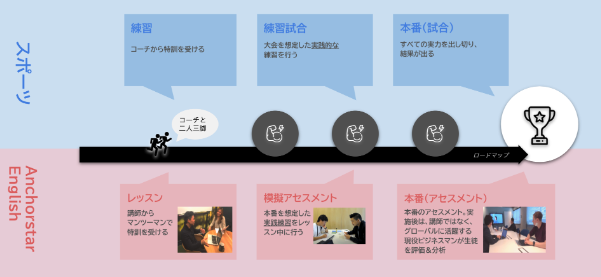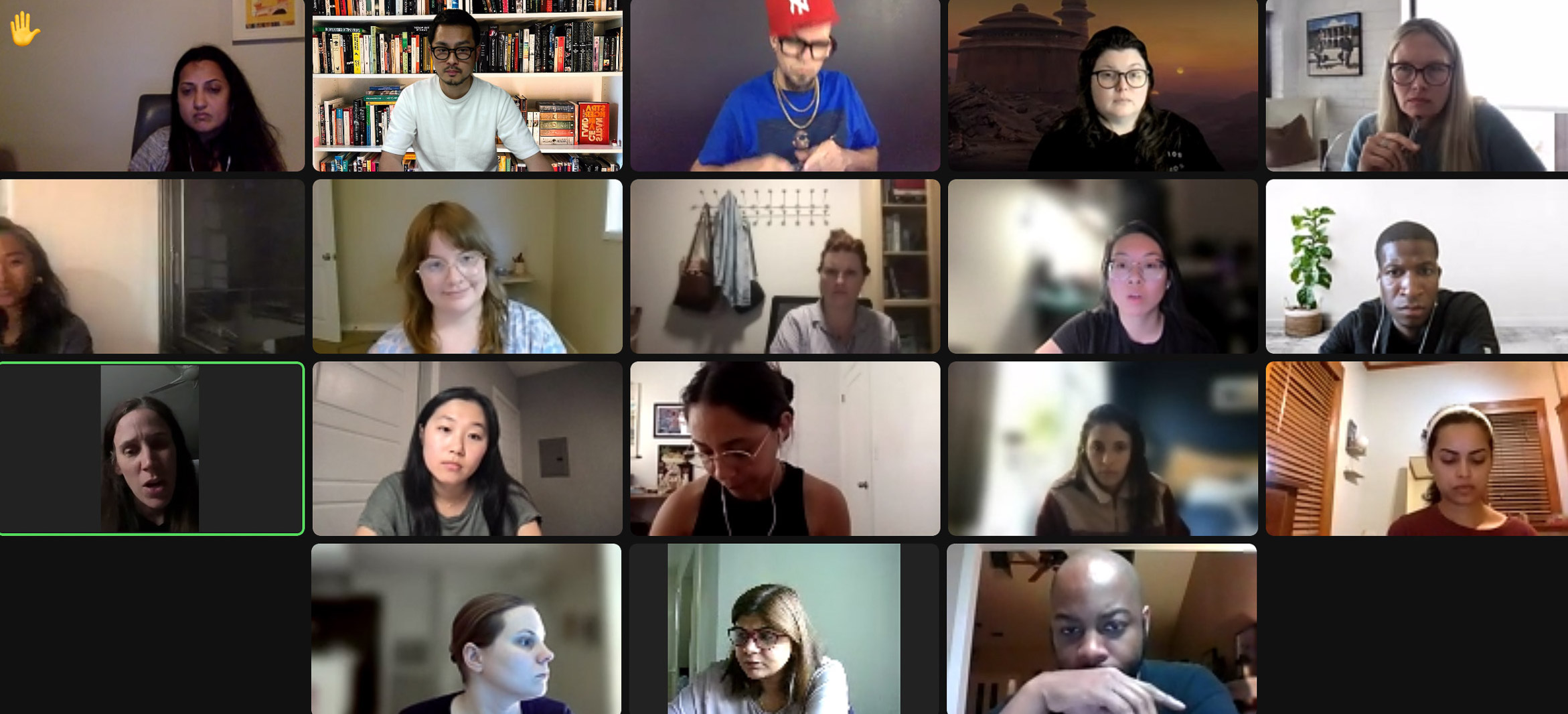*This article was originally written in Japanese and translated into English using DeepL (AI translation)
In the article “Simulated Experience: Hiring a Foreigner,” I (Miku) hired Nelson, an English teacher I met in New York, and introduced him to you up to the point where he came to Japan in June 2022. Since then, Nelson has been very active as the head coach of “Anchorstar English”. In this issue, we would like to share with you how Anchorstar’s first original education business, Anchorstar English, was launched, the services it offers, and our vision for the future.
Creating a corporate, weekday daytime, face-to-face, hands-on English conversation business
When Nelson came to Japan and was wondering what kind of English conversation business we could create, so we interviewed the partner companies that Anchorstar usually works with about their English-related issues. We found that, although many companies had enhanced their English education benefits, there were still many issues that needed to be addressed in the real world of business, and that there was still room and potential for improvement in English language education. Therefore, we decided to take on the challenge of developing an English language business specifically for corporate clients.
The most unique feature of Anchorstar English is its delivery method. We ask our corporate clients to reserve a meeting room in which to hold classes once a week. A teacher will be stationed there for the day, and each student will have a one-hour face-to-face lesson in that conference room. In this way, students do not need to commute to the school and can easily take lessons during working hours. Students are also more aware that teaching English as a profession, and are more motivated to take the lessons.
Because Anchorstar English is a “work-based English education” program, we are able to reflect the specific needs and goals of the departments to which our students belong in our lessons, and we regularly share information with the heads of departments to which our students belong, as well as with those in charge of internal education in the Human Resources Department, as needed. We operate the program while sharing information regularly with the heads of departments to which the students are assigned and, if necessary, with those in charge of internal education in the HR Department. For example, by listening to not only English-related issues, but also issues faced by the company as a whole and the expected effects, we try to provide practical skills necessary for a variety of tasks.
Become a “Global Communicator,” not a native speaker
Anchorstar representative Kodama was born in Yokosuka City and attended a very ordinary Japanese elementary school until he moved to the United States at the age of 10. Of course, English is not my first language and I am not a native speaker of English in terms of pronunciation and grammar, but after returning to Japan, I was in charge of service development with Yahoo! Japan in the US, and at Facebook Japan I was in charge of growth strategy in Japan, where I worked closely with the head office. I have worked across language barriers.
Kodama says that because he is not a native speaker of English, he has practiced speaking simply, combining words that are easy to convey as much as possible, making each sentence short and loud enough to be easily understood, regardless of the other person’s level of English.
We call this kind of person who communicates with an absolute focus on “getting through” to others a “global communicator”.
At Anchorstar English, we have decided to make every effort to train these “Global Communicators”. Rather than training English skills through repetitive practice using general materials, we place the highest priority on learning various communication methods that can be used to “communicate” and mastering those methods.
Our concept of “communication” is a complex act that involves not only language skills, but also a great many other factors such as facial expressions, mood, loudness and tone of voice, mindset, body language, and responding according to the other person’s communication skills. We believe that even if one’s English skills are at a beginner level, it is possible to fully communicate with others with a strong mindset and appropriate body language.
In other words, in order to communicate with diverse elements intertwined, it is not enough to just polish your English skills and get a high score on a test.
For example,
A. A person who have lived in an English-speaking country as a child and speak fluent English with beautiful pronunciation.
B. A person who learned English as an adult and speaks slowly, but can speak simply and clearly to the point, even with a small amount of words.
In a business environment where communication is required to achieve a goal, it is very possible that person B is better than person A.
We have examined how to train and evaluate communication “to get through” in this complex English language.
Coaches help players “get the best results in the game”.
“English Like a Sport”.
This is the concept behind Anchorstar English.
After much discussion, we have come to believe that communicating in English “to communicate” is like a sport that combines skill and expression, such as figure skating, ballet, or skateboarding.
It is very similar to English in that “you can’t win if you only improve your technique, and you can’t win if you only excel in expressive ability. If this is the case, Anchorstar English may be able to apply this kind of sports training concept. The teacher-student relationship can be viewed in the same way as the coach-athlete relationship.
For example, figure skaters work with their coaches to prepare for the big competition by analyzing their current situation, formulating a strategy to win, developing a training menu to achieve this, constantly monitoring the athlete’s progress, and practicing daily while taking care of injuries and physical condition. They also develop a strong, non-nervous heart by playing simulated matches and participating in small competitions to gain experience.

At Anchorstar English, we have decided to apply this same approach to sports training. Periodically, “assessments” (matches) are held, and the students’ main goal is to “perform at their best in a realistic environment. Assessments are recorded on video and evaluated by a panel of judges (such as Kodama) who are “global communicators. The judges evaluate the students’ performance in terms of whether they are actually “communicating” and provide specific feedback on what was good and what could be improved.
In this way, Anchorstar English places the utmost importance on students and coaches being trusted partners working toward a common goal: to perform at their best and communicate with others in the real world.
Interview with Nelson, Head Coach of Anchorstar English

We asked Nelson, a founding member and head coach of Anchorstar English, many questions about how he usually conducts lessons, what he keeps in mind, and what he thinks.
Q: How does a one-hour lesson usually go?
We usually have a warm-up where we talk a bit about their work and daily life. After that, I prepare customized content that will be of interest to each student, and we discuss them. Since my training is primarily conversational, it takes the form of a dialogue where we work together to create meaning. I don’t see myself as an “instructor,” but as a “coach” running alongside my students, learning from each other. I also learn a lot from my students on a daily basis.
Q: How much do students talk in an hour?
It depends on the content, but I strive to have students speak 80% to 90% of the time, and I try to put them in the spotlight. For example, generally the whiteboard is behind the teacher, but during my lessons the whiteboard is behind the students. Students use the whiteboard to explain things to me and teach me. Of course, I provide language and communication support.
Q: How do you decide on the content of your lessons?
Our goal is to go beyond language learning and improve communication skills. Therefore, we repeatedly practice a variety of communication enhancement tools. That does not mean that we ignore the specific needs of our students. For example, if a student has a presentation the next day or needs to give some directions in English, we immediately respond to that requirement and practice with them. We then provide interesting topics and new input to help students gain a broader perspective.
In other words, we are very flexible in deciding the content of our lessons according to the needs of each student, while keeping in mind that we are trying to develop the areas that are a challenge for each student.
Q: Is there anything you usually pay special attention to during lessons?
For each student, I try to take as many detailed notes as possible during the lesson. My role as a coach is not only to teach language and communication, but also to understand the students’ lives, their stories, and their thought patterns. I recognize the strengths and weaknesses that each student has, and I am always thinking about what training and activities can help each student grow and improve their communication skills.
Q: Is there any difference between the corporate education and the individual education you have been doing?
My basic educational philosophy is the same. However, in a corporate environment, there are often set goals and clear output requirements, so I have to design activities that are faster, more efficient, and use new methods to help students reach their goals. It is very exciting.

Q: You are giving lessons at several companies now.
The differences between companies are interesting, but the differences between departments are also very interesting. There are big differences between each company, each department, and each position or role within that department. Senior managers, middle managers, or those in the field. The communication required for each is different, and of course the language level is completely different.
Each department also has its own specific goals and roles. For example, in the sales department, there may be many opportunities for presentations and the need to have deep relationships with customers. On the other hand, departments involved in global projects need to collaborate with partners around the world. Each department and level has different needs and challenges.
Q: What is the best thing about starting Anchorstar English?
I am thrilled to meet some really great people. I am learning more from them than from my students. The students have so many interesting stories to tell, which is very inspiring to me.
Q: Do you have any thoughts on Nelson’s dream or what you would like to do in the future?
My dream is to spread the idea of “global communication” throughout the world. Imagine a world where communication and language barriers are eliminated. People from different cultures would be able to communicate smoothly. I take a similar approach when I work with anchor stars and other teams on a daily basis. I still don’t speak Japanese well, but I still manage to live in Japan and collaborate with my Anchor Star colleagues. I find myself daily realizing that even beginners can enjoy working together through global communication. I believe that the language itself is not the problem, but the way we communicate, our adaptability, and our mindset of trying to communicate with others.
Q: Is there anything you would like to share with our readers?
Explore, explore, explore. Don’t stay cooped up in Japan, but actively explore the world and experience different values!
Future Prospects
Anchorstar English is our first venture into education. Working with Nelson and other experienced global communicators, it is a meaningful and worthwhile challenge to think seriously about education from the ground up and create a program that we can be proud of as our ideal. We are looking forward to receiving lots of feedback from our students and partners to refine our program and create lots of “joy of communication”.
Thanks to your support, Nelson is currently unable to meet the demand we are receiving alone, and we are in the process of recruiting new coaches. We have 250 potential coaches who have applied for the position because they share our vision of English education. Our team is looking forward to the opportunity to do even more as we add more people to our team. Thank you for your continued support of Anchorstar English.









